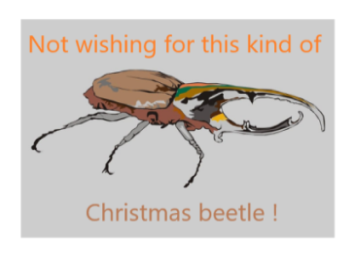The Department of Agriculture, Forestry and Fisheries (DAFF) has issued their Christmas newsletter about Stink Bugs (BMSB). It contains information for Importers and Brokers on what goods are subject to the New, Unused and not Field Tested (NUFT) criteria and when a NUFT declaration can be utilised – as well as tips for imports during the festive season.
New, Unused and not Field Tested (NUFT) goods.
Manufacture must start on or after 01 December of the current BMSB risk season to be eligible.
NUFT declarations may be used for eligible goods shipped in sealed six hard sided containers, goods shipped as break bulk (including flat rack and open top containers) and consignments in LCL / FAK containers.
If your goods meet all the following criteria, they will not be subject to mandatory BMSB treatment (random inspections will still apply):
- Have the goods been manufactured on or after 01 December? (Manufacture must start on or after 01 December of the current BMSB risk season).
- Are the goods classified under the following tariff chapters only: 82, 84, 85, 86, 87, 88 and 89?
- Can evidence be provided in the form of a BMSB NUFT (new, unused and not field tested) manufacturers declaration that the goods are manufactured on or after 01 December?
Good shipped as break bulk (including open top and flat rack containers) will not require mandatory offshore BMSB treatment, if they meet the above requirements for BMSB NUFT.
Break Bulk, Open Tops and Flat racks
Where goods are tariffed as target high risk goods and shipped as break bulk (including open top and flat rack containers), they must be treated offshore prior to arrival into Australia.
If these goods arrive in Australia untreated and are discharged off the vessel, they will be directed for export to be treated offshore prior to returning to Australia. There are no provisions for onshore treatment of this cargo type and no exemptions will be granted.
Mixed Goods Consignments
DAFF says it often sees containers of non-target risk goods that include promotional or gifts from suppliers that fall under target risk tariffs during the lead up to the festive season. These target risk tariff promotional, or gift items render the container subject to BMSB measures.
In past years they have seen free promotional material added in such as glasses, metal champagne buckets, promotional tins and cheese knives in containers of cheese etc all of which are tariffed as target high risk goods and render the container needing BMSB treatment.
Containers which are packed with a mix of target high risk and non-target goods, will be assessed for highest risk level. Importers should ensure that if suppliers are placing these goods in the container, they are made aware of the BMSB import conditions and goods are treated accordingly prior to packing in containers.
Follow this link to read DAFF’s Seasonal measures for Brown marmorated stink bug (BMSB).
Also see our related article: Clarifying Rules for BMSB Treatment.
Colless Young offers you professional advice on all matters related to Customs clearance and quarantine procedures. As licensed Customs Brokers and International Freight Forwarders, we provide a complete range of logistics services, both air and sea cargo, through all Australian ports and airports. We handle imports, exports, trucking, warehousing and fumigation treatment.

